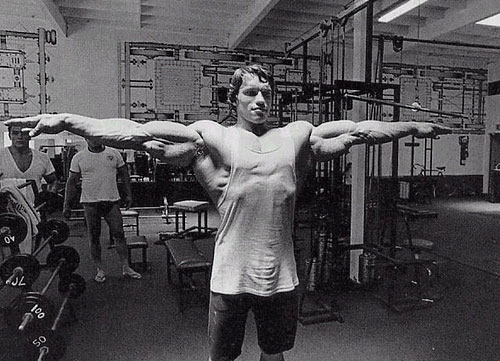When it comes to dieting, if you’re like most bodybuilders, you tend to think in terms of losing bodyfat. When that’s your only focus, though, you may be overlooking one of the most important and complex elements of the dieting process: your hormone levels.
Role Of Hormones

Hormones are crucial chemicals that your body manufactures, and their levels can make or break your physique. Your body naturally produces all sorts of hormones to support muscle repair, growth and recovery. When you diet to reduce bodyfat, your growth-supporting hormones may take a nosedive, resulting in a loss of muscle mass. This month, I focus on the four biggest problems you can create by overdieting: decreased thyroid function, lower testosterone levels, immune-system compromise and lower leptin levels. Don’t despair I also detail ways to approach your dieting so you can avoid those pitfalls and keep your muscle mass while continuing to shed bodyfat.
Pitfalls Of Overdieting
Thyroid Function Decreases
Arnold Schwarzenegger governs California. He’s the chief, the director, the head honcho. In the same way, your thyroid governs your body. Specifically, thyroid hormone helps regulate how many calories your body burns each day. It also impacts muscle growth by speeding up or slowing down protein synthesis. Overly strict dieting can backfire because it may cause thyroid hormone levels to fall. The result is that your body burns fewer calories.
Even though you’re eating less, you may not burn fat as effectively as when you were eating more calories. This reduction in your metabolic rate can negatively impact your body’s ability to lose bodyfat.

Testosterone Levels Drop
When calories are cut too aggressively, testosterone (the hormone that supports muscle growth) declines, leading to a compromised ability to “hang on” to hard-earned muscle mass. It’s crucial to keep testosterone levels up to hold on to muscle mass. It’s also important to keep testosterone levels elevated because doing so helps to cut bodyfat. Testosterone does this through two processes. First, it increases the number of beta-receptors (the parts of a fat cell that help to break down stored fat) and, second, it inhibits the activity of lipoprotein lipase (an enzyme that “sucks” fat from your bloodstream and stores it) near fat cells. The last thing you want as a dieter is a decline in your testosterone levels.
Immunity Is Impaired
The immune system is your body’s built-in homeland security patrol, protecting it from germs, bacteria, viruses and anything else that might break down your body. Overdieting, which decreases calories too much or for too long, may ultimately have a negative effect on your immune system. A weak immune system has a direct impact on your body’s ability to hold muscle. Impaired immune function can also cause rises in cortisol, a stress hormone that tears down muscle elevated cortisol tends to decrease testosterone.

A body with a weak immune system finds it harder to destroy free radicals, the tiny components usually associated with stress, including the stress from weight training. Increased amounts of free radicals can lead to insulin resistance, a condition that elevates insulin levels a contributor to the storage of bodyfat.
Leptin Levels Decline
Leptin is an important hormone that helps your body regulate its weight. Overdieting can cause a decline in leptin levels, which creates two dieting obstacles. First, you may experience an increased intensity in food cravings (leading you to eat more than you want). Second, decreased leptin can also slow down your metabolic rate, making it more challenging to shed bodyfat. Coupled, these problems can have a severe impact on your ability to diet effectively.
Smart Diet Strategies
Reduce Carbs By No More Than 30%
If you normally eat 500 grams (g) of carbs each day, don’t drop the amount to below 350 a day. A 30% drop in carbs is more than enough of a decline to encourage fat loss. Jumping straight into extreme low-carb dieting can backfire, flattening your muscles and triggering one or more of the four pitfalls. Longer but less severe diets are a much more effective way to burn bodyfat while maintaining muscle mass.
Don’t Cut Out Simple Carbs
In their zeal to rip up, many bodybuilders choose only slow-burning carbs, such as oats, yams, beans and red potatoes. They reason that these carbs release less insulin than others and that lower insulin levels encourage fat burning. Although that’s true, I always suggest that for two out of every 10 training days, carbs should be fast burning. For example, a bodybuilder who has cut carbs to 350 g per day stays at that number but switches to fast-digesting carbs, such as white rice mixed with raisins, bagels with jam, Cream of Wheat cereal, rice cakes and fat-free toaster pastries. In my experience, this seems to help preserve muscle tissue, most likely by increasing insulin levels.
When insulin levels rise above typical levels without higher calorie intake the result is greater muscle maintenance without the storage of bodyfat. In other words, you get the benefit of the anabolic effect of insulin without the fat-storing effect.
Eat Fewer Carbs When You Don’t Train
What about rest days? Normally, you should aspire to the recommendation of at least 1 g of protein per pound of bodyweight even a little more when dieting as long as your carb intake is sufficient. After all, you need carbs to train and to help support thyroid levels. However, on rest days, you should dramatically decrease your carbs. Consume about 100 g on your days off from training, but increase your protein intake to 2 g per pound of bodyweight on those days. Temporarily increasing protein while decreasing carbs can improve the ability of muscles to uptake glucose.
When you return to a higher carb intake, say 350 g, and the gold standard 1 g or more of protein per pound of bodyweight, the carbs are more readily stored in muscles, keeping them in an anabolic state during your dieting phase. If carbs are being deposited in muscles, then they’re not headed for bodyfat storage.
Don’t Overdo Cardio
There’s no doubt that cardio is an effective part of a fat-loss strategy. It burns calories, and much of what it burns is bodyfat. Key word: much (not all). Overdieting can suppress hormones, such as thyroid and testosterone, and it can downgrade the immune system. Excess cardio, though, can be even more destructive than overdieting in reducing important hormones. In other words, if you go overboard trying to burn calories with cardio, you may lower hormone levels that help burn fat and build muscle. The result is that you end up looking terrible. Excess cardio is a dead end and can cause a severe loss in muscle mass.

I remain steadfast in my belief that four 45-minute sessions a week is the max you should do if you hope to keep your thyroid and testosterone levels up and your immune system potent.
Cheat Within Reason
Bodybuilders always ask me if cheating eating a lot more on one day a week is helpful. The premise is that greater food consumption once a week will help keep your metabolism from dropping. Cheating I generally define it as doubling up on carb intake is permissible and even helpful only after you have hit a wall in your weight loss or, more important, no longer appear to be hardening up. My experience tells me that point is not reached weekly so cheating one day a week is out. In my opinion, metabolic slowdown usually occurs 10-17 days into a diet, depending on the person.
At that point, increasing calories specifically carbs can keep leptin, thyroid and testosterone levels, as well as the immune system, from crashing. That should help your body and not hinder your bodybuilding progress.
The Logical Conclusion
Dieting involves a cascade of metabolic processes and, as a bodybuilder, you want to encourage the processes that support bodyfat reduction while discouraging those that tend to reduce muscle mass. To do this, moderate dieting over a longer period of time is a better approach than severe dieting over a short period of time.
As with all things in bodybuilding, the best way to achieve an extreme physique is through consistency and moderation.
Author: Chris Aceto
Website: Procardnutrition.com
COPYRIGHT 2008 Weider Publications
COPYRIGHT 2008 Gale, Cengage Learning










